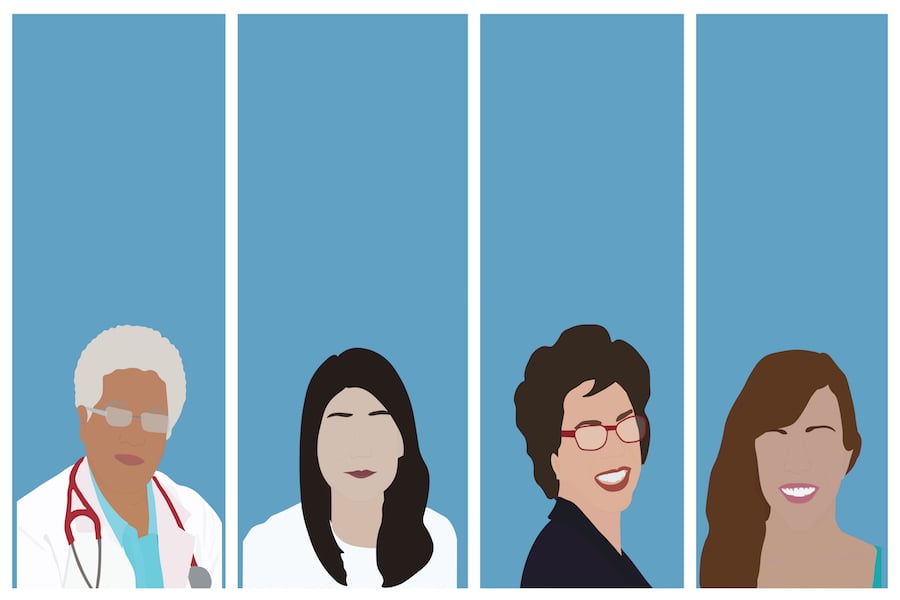Panelists discuss racism and impact of coronavirus on marginalized communities
The panelists from Health Professions Advising and Multicultural Student Affairs panel. Scholars discussed how systemic racism in the United States has made historically marginalized communities more vulnerable to coronavirus.
November 12, 2020
Northwestern’s Health Professions Advising and Multicultural Student Affairs co-hosted a panel Wednesday where scholars discussed how racism and racist practices have made historically marginalized communities more susceptible to COVID-19.
José Ramón Fernández-Peña, director of NU’s Health Professions Advising, moderated the discussion and following Q&A on Zoom.
Sunmin Lee, a professor at the University of California, Irvine, began the discussion by addressing the lack of accurate COVID-19 data collection and reporting. Lee said most current data collection “lumps Asians” into other racial ethnic groups, such as “White” and “other,” making it difficult to obtain Asian-specific data.
“One of the biggest challenges I always face as a researcher who works for Asian American groups is the lack of disaggregated data,” Lee said. “It’s difficult to track down how COVID-19 is affecting Asian subgroups.”
Lee said policymakers and health care leaders must heed calls to obtain and release disaggregated data. She said hospitals failed to consistently record and track demographic data at the beginning of the pandemic and have improved only marginally.
Linda Rae Murray, an adjunct assistant professor at the University of Illinois, echoed Lee’s sentiment, stressing the urgency of more comprehensive research.
“We don’t really have the hard data now,” Murray said, “And that’s the problem because if you don’t understand who’s getting sick and who’s getting sick more and why they’re getting sick — your hands are tied.”
All of the panelists agreed that language, housing, lack of insurance and occupation were the primary contributors to the virus’ disproportionate harm to marginalized groups.
Immigrant workers, Lee said, are over-represented in sectors that not only involve high in-person contact but also are suffering mass layoffs, such as the restaurant and hotel industries. She added speaking a foreign language increases the likelihood of contracting coronavirus by more than 2 percent and living in a multigenerational household or cramped spaces increases the likelihood by more than 1 percent compared to non-communal living.
Olivia Denise Carter-Pokras, a professor at the University of Maryland, agreed with Lee on how multigenerational households and close living quarters render marginalized communities especially vulnerable. The average household size of Maryland Latinos is nearly 4 percent larger than those of the rest of the state, Carter-Pokras said.
These families are also more likely to live in smaller homes, such as apartments, where social distancing and isolation are difficult, Carter-Pokras said. She added that multigenerational households face additional challenges with contact between the children and elderly.
“The recommendations that are coming out from the CDC don’t match the reality,” she said. “They’re saying the grandparents should be staying away from the kids, but who’s going to take care of the kids when the parents go out to work? And what if one of them is actually sick?”
Panelists called for local, state and national government investment in community-based care and more accessible services. Lee said coronavirus is “an evolving situation requiring multi-level strategies” and mentioned that clinicians must focus on the “prevention and treatment of COVID-19 comorbidities rampant in minority communities” such as cardiovascular conditions.
Calling it “no coincidence,” Murray traced minorities’ increased susceptibility to coronavirus back to systemic racism.
“How do you expect people who don’t have running water to adequately address an infectious disease like this? What happens if you don’t have health insurance in this country and you get laid off?” she said. “The pandemic rips the covers off a horrible bed and let’s us see the cracks and crevices of what is not working. We need to identify and correct the structural problems when battling this disease.”
Email: ejunkim2023@u.northwestern.edu
Twitter: @ejun_kim
Related Stories:
— Panelists discuss impact of 2020 presidential election on BIPOC communities
— Organization of Women Faculty talks equity amid COVID-19 with Provost, deans



